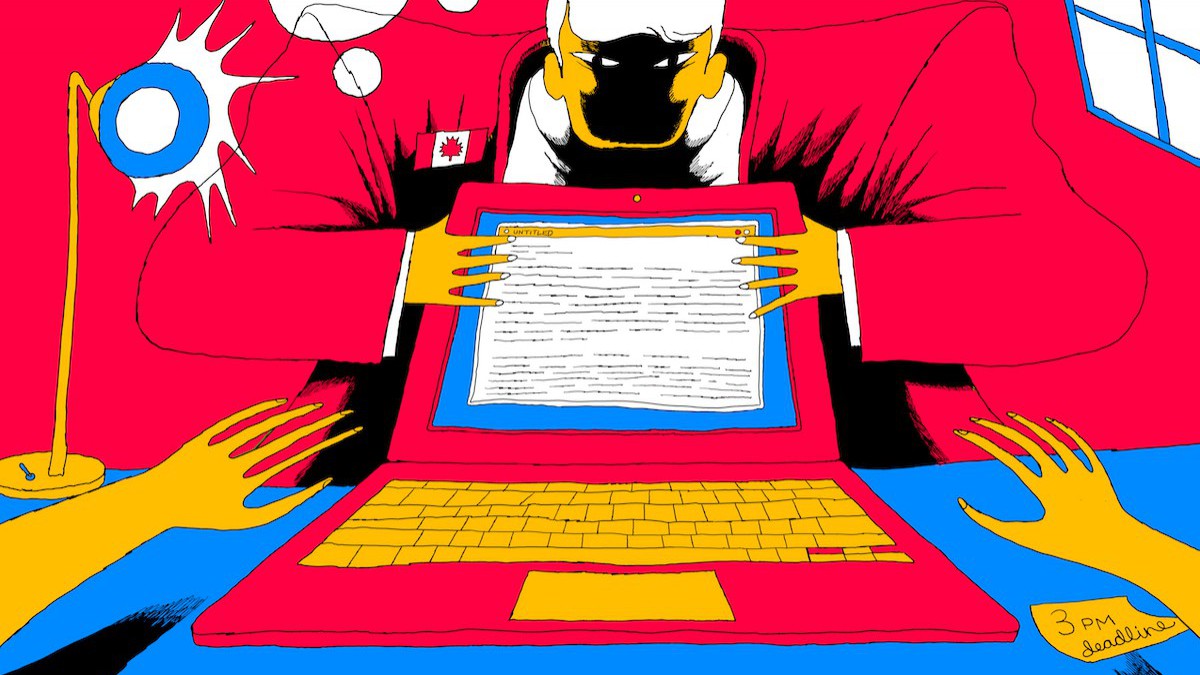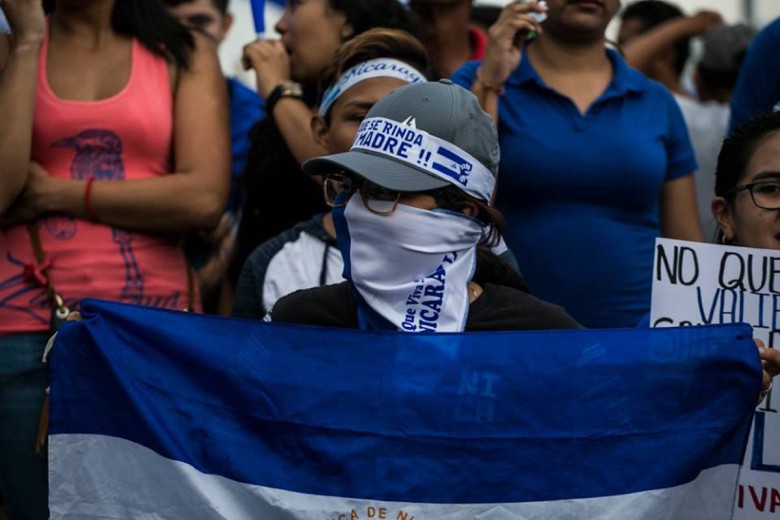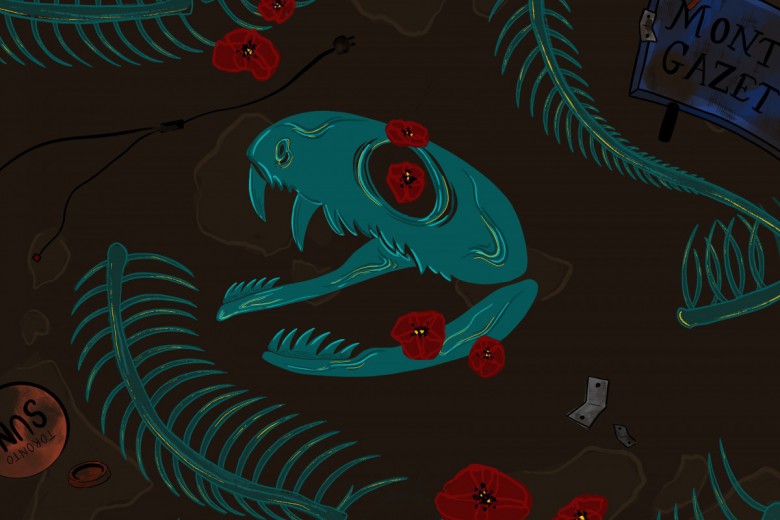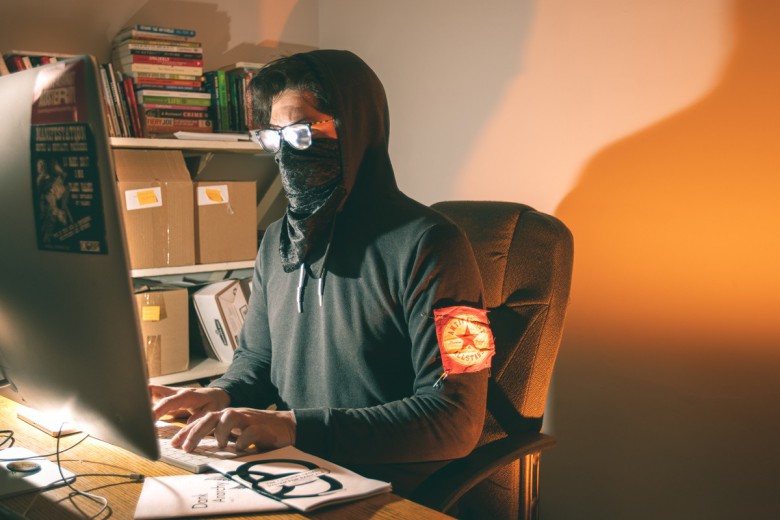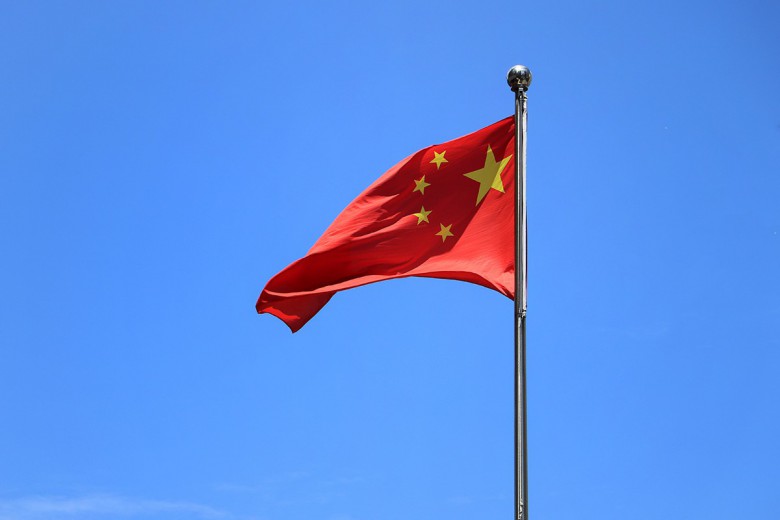When I published an article by Humber College professor Tyler Shipley explaining the historical context of the war in Ukraine in The Maple back in March, I expected pushback. Russian president Vladimir Putin had just launched an illegal invasion of Ukraine, and amid the horrific violence and destruction, the public’s emotions were running high.
The article doesn’t say anything particularly controversial. Shipley describes the war as part of a larger and longer conflict between the leaders of NATO powers and a jingoistic Russian oligarchy. He points out how the social and economic catastrophes that followed the collapse of the Soviet Union were exploited by Putin, who enriched himself while preying on Russian people’s psychological pain and economic hardship. Shipley argues that the West then exploited a divided Ukraine by backing the 2014 Maidan uprising that ousted the country’s elected president, Viktor Yanukovych, who had maintained relatively warm relations with Russia. He points out that the Ukrainian far right played a key role in that uprising and expanded its influence in the years following – a fact Putin used to falsely justify his invasion in 2022, claiming he was attempting to “denazify” Ukraine. The article discusses Ukraine’s attempts to join NATO, a move that Russia has long viewed as a security threat.
Many of these points had been widely reported in mainstream news outlets for years before Putin’s invasion, to little dispute. But Shipley’s article came at a particular time, which means it was received very differently.
Mainstream media today, meanwhile, have tailored and shifted their narratives regarding the war in Ukraine in ways that suit the West’s geopolitical objectives.
In the first weeks after Putin’s invasion, we were in a media environment in which anything other than unequivocal support for sending unlimited weapons to Ukraine was smeared as pro-Russian propaganda. Shipley’s article was met with attacks, culminating in a (now deleted) death threat from a Twitter account belonging to a musical instrument retailer (I’m not kidding), who said that The Maple, Shipley, and defenders of his article were “disgusting insects that need to be exterminated.”
Given this sometimes-unhinged media climate, I was left asking: how do we as independent journalists continue to do critical reporting on the war without alienating our audiences or succumbing to bad-faith attacks on our work?
State attacks on journalists
Shipley wasn’t the only writer to experience this. Over the months that followed, academics and branches of the Canadian government attacked journalists offering critical context for the war. A study published in June out of the University of Calgary cynically framed criticism of NATO, concerns about the Ukrainian far right, and “mistrust of Canada’s Liberal government” as examples of “disinformation” and “pro-Russian propaganda.” Its lead author, J.C. Boucher, is an academic who has received funding from the Department of National Defence.
After the report was published, Boucher got into a Twitter altercation with Dimitri Lascaris, the runner-up in the federal Green Party’s 2020 leadership race and an outspoken critic of both NATO and Putin’s invasion. Boucher claimed that Lascaris was “# 25 of influencers in the pro-Russian disinformation cluster” on Twitter. During a podcast interview in early June, Lascaris revealed that hostility toward him due to his dissenting views on the war in Ukraine (and foreign policy more generally) contributed to his decision not to run again for Green Party leader.
For their part, the Department of National Defence and Global Affairs Canada (GAC) have published resources supposedly aimed at countering “Russian disinformation,” including a link to a NATO propaganda page that frames criticism of the military alliance’s wars in Libya and Yugoslavia – each of which resulted in hundreds of civilian deaths – as based on a “myth” about the alliance’s aggressive nature.
“You have a kind of jingoistic climate, which is very similar to what the climate was in the wake of September 11, [2001].”
Similarly, a dedicated GAC page titled “Countering disinformation with facts” characterizes criticism of NATO aggression as a Russian “false claim” and states that the military alliance “increased its military presence in the eastern part of the Alliance as a direct result of Russia’s behaviour, which reflects a pattern of aggressive actions against its neighbours.” In fact, NATO invited three Eastern European countries – the Czech Republic, Hungary, and Poland – to enter talks to join the alliance in 1997, when Boris Yeltsin, the widely despised former Russian president, was still in power and maintaining warm relations with the U.S. (despite his insistence that NATO’s eastward expansion was a serious mistake). NATO enlarged farther in 2004, to Russia’s borders, against strong objections from Russian leaders and commanders who were “deeply unsettled and angered” by the move, according to the New York Times.
Mainstream media today, meanwhile, have tailored and shifted their narratives regarding the war in Ukraine in ways that suit the West’s geopolitical objectives.
My colleague, Davide Mastracci, and I found that major Canadian newspapers and the CBC went from describing the Ukrainian military’s Azov Regiment as a neo-Nazi group in 2014 to downplaying or omitting any mention of the group’s far-right ideology when its troops became central figures in news coverage of the war in May 2022. This change in narrative, Ivan Katchanovski, a University of Ottawa professor with expertise on Ukraine, told us, has no basis in evidence, but it suits the West’s framing of the conflict as one being fought exclusively by heroic Ukrainian patriots. Extraordinarily, pointing this out got me and Mastracci accused of helping Russia kill Ukrainian civilians.
A “jingoistic climate”
“[It] just really kind of went off the rails right after the invasion, which I have to say, I didn’t see coming,” says Branko Marcetic.
Marcetic is a staff writer with Jacobin who has provided critical coverage of the U.S.’ role in the war in Ukraine. He tells Briarpatch that in private emails and messages, readers express appreciation for his work, but on social media he experiences dishonest pushback against his cautions and critiques of Western policy.
“You have a kind of jingoistic climate, which is very similar to what the climate was in the wake of September 11, [2001],” he explains – a time when seemingly any critique of Western policy in the Middle East was smeared as an apology for al Qaeda.
In both cases, such a climate resulted in an immediate conformity of opinion, particularly among the press and intellectuals, Marcetic notes. This is in part because of a concerted push to make academics and journalists concerned about the repercussions for holding the “wrong” opinions or being smeared as Putin supporters. Such tactics are being recycled from George W. Bush’s “War on Terror,” during which newspaper editors buried or killed stories that complicated the pro-war narrative, according to former New York Times reporter James Risen.
“A lot of outlets don’t necessarily want to publish stuff that ends up being controversial, even if what was being said isn’t particularly extreme or radical,” says Marcetic. “It also means that people are less likely to have an open mind coming into reading a piece, because if someone or some outlet is tarred as pro-war, or pro-Putin, people go, ‘oh, well, I don’t have to listen to this, it’s just propaganda.’”
Marcetic points to how the same news outlets that just months before the invasion had been reporting on the dangers posed by the far right in Ukraine suddenly claimed that these well-documented facts were exaggerated or false. He says that mainstream news painting a distorted portrait of the war is due, in part, to the misguided belief that reporting honestly on the circumstances surrounding the conflict somehow harms Ukraine’s war effort.
“There’s a very concerted effort to make people not think about those more complex, messy questions,” Marcetic says.
The intense propaganda coming from both sides of the conflict has also made deciphering facts on the ground particularly difficult. Exact casualty numbers, for example, are hard to pin down. As well, stories surrounding Ukraine’s initially failed Kherson campaign in an otherwise successful September counteroffensive painted radically different narratives about what actually happened. Some outlets, like the Washington Post, described a horrific battle in which Ukrainian forces were outnumbered by Russian. Others, like the Guardian, framed the Kherson campaign as a strategic ruse intended to divert Russian forces.
The spin and propaganda in the coverage of the war has closed many people off from taking a more neutral or skeptical approach to the information coming out of it, Marcetic says. Because NATO’s eastward expansion over the past three decades and the presence of neo-Nazis in Ukraine have been key parts of Russian government narratives, anyone who raises those issues in good faith gets smeared as a Putin apologist.
“Things that are true are used for propaganda all the time, even if they’re exaggerated or understated,” notes Marcetic.
For left-wing journalists writing for publications like Jacobin or The Maple, there’s another challenge. The war has engendered a split on the left, with some who were justifiably appalled by Putin’s invasion on February 24 “[taking] more of a liberal interventionist stance towards the war than they would otherwise do in other conflicts,” Marcetic explains. This stance – while virtually indistinguishable in practice from neo-conservatives’ pro-war stance – might charitably be understood as a reaction to what some would describe as “campist” tendencies on the left, which, while marginal, seek to portray Russia as a cornered victim that is justified in its militaristic response. In many cases, however, liberal interventionists overcorrect. They recognize only Russia’s aggression and confuse genuinely “campist” analyses with those that (correctly) recognize the conflict as an inter-imperial proxy war.
None of this is to say that supporting arms for Ukraine is indefensible, Marcetic explains. But when those weapons may mean more death and destruction – not to mention enriching arms dealers in the process – it’s important to be able to criticize NATO and other actors who would extend the war. Marcetic points to the case of Libya, where NATO’s disastrous intervention in 2011 to depose Moammar Gadhafi resulted in civilian deaths, human rights abuses, and economic collapse.
“There’s a very concerted effort to make people not think about those more complex, messy questions,” Marcetic says.
Challenges for mainstream reporters
If the challenges for independent journalists working for left-wing publications are steep, then they are arguably even more so for those writing in mainstream outlets. Christy Somos, a journalist and associate producer at CTV News, reported in April on the mounting evidence that the Canadian Armed Forces (CAF) had, before Putin’s invasion, trained members of Ukraine’s military with far-right political affiliations. The far-right Ukrainian group at the centre of the story, Military Order Centuria, has links to the neo-Nazi Azov movement.
Somos had been keeping tabs on the far right in Ukraine since the 2014 Maidan uprising, and in 2021, a report out of George Washington University revealed that Centuria troops had boasted online about receiving CAF training. The report’s author told Somos that the images demonstrating the connection were not hard to find on social media.
Then, reporting by the Ottawa Citizen’s David Pugliese revealed that not only had Canadian officials met with and been briefed by Azov Regiment soldiers in 2018, but the CAF was more concerned about media exposing the meeting than the fact they had been working with Nazis. In April, Radio Canada’s Simon Coutu also obtained documents proving that Azov Regiment soldiers had been trained by the CAF.
After Putin’s invasion began, says Somos, applying any sort of critical lens to Ukraine quickly fell out of fashion. Ukrainian flag emojis, trident symbols, and art projects began popping up all over social media. Humanitarian aid was sent, which Somos says is a good thing. But with that also came a rush of weapons transfers from Western governments.
“That, to me, was kind of a red flag,” Somos tells Briarpatch. “Just giving any country a sort of carte blanche with these weapons and with this money, and not addressing the elephant [of extremist elements] in the room did not sit well with me.”
She notes that Canada’s Department of National Defence insisted that no weapons would end up in the hands of neo-Nazi units, something it would ensure through end-use certificates filled out by the Ukrainian Ministry of Defence. The department told The Maple the same thing in March. However, as recently as September, the department changed its tune in its response to inquiries from The Maple and refused to rule out that groups like Azov had been receiving Canadian weapons.
More recently, the CAF claimed – without any substantiating evidence – that photos in the George Washington University report had been “doctored” to support “Russian disinformation,” but could not say which photos were changed or if they believed this discredited the report’s overall findings. When pressed for evidence, they deferred to Ukraine’s Ministry of Defence (which, unsurprisingly, was not available for comment).
“Just giving any country a sort of carte blanche with these weapons and with this money, and not addressing the elephant [of extremist elements] in the room did not sit well with me.”
CAF made the suggestion – which had not previously been made public – after I contacted them regarding documents obtained through an Access To Information request. Those documents showed military officials admitting in the fall of 2021 that they believed the report was credible and not a “Russian info ops campaign.” As well, the documents showed officials were primarily concerned about managing responses from journalists and social media users to the report, and the possibility that it might be used to criticize Operation Unifier, Canada’s training program in Ukraine.
“[This] tells me that they were extremely concerned with image and backlash,” says Somos. “But on the flip side, they’ve known it was an issue, they’ve been contacted by several reputable journalists about this, but they have done nothing to remedy this, and they are happy to watch on the sidelines of social media while journalists like myself and others get lambasted or threatened or trolled.”
Somos also expressed concern at the fact that the CAF simply took the Ukrainian Ministry of Defence at their word regarding the allegedly “doctored” photos, and did not seek out more information. “It’s about saving face and sticking to the script,” she explains. Amid the fog of Putin’s invasion – and the atrocities and chaotic information conflict that it triggered – the CAF appear to have been afforded a convenient degree of plausible deniability, especially as dominant media narratives shifted toward smearing any reporting on the Ukrainian far-right as supporting “Russian propaganda.” Meanwhile, Putin’s invasion potentially risks creating even more fertile ground for far-right radicalization in the future.
“This is not an issue that’s going to go away even when the war stops,” says Somos.
Somos has been publishing articles about the far right in Ukraine since 2021. She says the reaction to her reporting last year was positive, with recognition from many readers that the topic deserved scrutiny. But after the invasion began in February, she began to receive aggressive messages.
“It’s about saving face and sticking to the script,” she explains.
In our interview, Somos read out emails in which she’s called a “goddamn Putin shill,” a “mouthpiece of Russian propaganda” and “a traitor to Canada and Ukraine.”
“The blood of so many are on your hands for writing this and for feeding the Russian war machine,” reads one email. “I’ll not rest until you are terminated for supporting the Russian occupation and genocide in Ukraine. Go back to Moscow, coward,” reads another. Notably, Somos says, most of the emails came from within Canada, not Ukraine.
Despite the violent threats she’s received, Somos says journalists must continue to critically cover the far right in Ukraine.
“I think that no matter how highly you think of another country, that does not protect them from scrutiny, especially when there are obvious extremist elements and questions that deserve and demand to be answered,” she says.
“Just because the repercussions may be inconvenient, or downright unpleasant, does not outweigh the fact that my job as a journalist is to expose things that maybe people would rather not talk about,” she adds. “My intent is not to smear Ukraine. My intent is just to tell the stories that I found.”
Why we need to keep pushing
Mila Ghorayeb is a law student and columnist for Passage who recently wrote about the broken political discourse surrounding the Ukraine conflict. She told Briarpatch that analyses of the blowback playing out in Ukraine caused in part by the U.S. and Canada’s actions seem to be off limits in the current climate.
“We’re supposed to act as though the actions that the West took in 2014, for instance, or NATO expansion, would have no impact on Russia,” she explains. “That argument is not even really allowed to be had; you kind of just have to comply with the narrative. [...] Anything other than unequivocal, semi-cartoonish condemnation is seen as an endorsement of Putin’s actions.”
Further, theories of international relations, such as John Mearsheimer’s “realist” school of thought, are considered off limits in the context of Ukraine, says Ghorayeb.
“I think people know, intuitively, that meddling in other people’s politics can bring disastrous consequences,” she explains. “I think that you just can’t really say that without a sort of backlash.”
“It allows foreign policy actors to feel that they can do whatever they want and get away with it.”
She also notes that even in cases where such analyses are accompanied by clear, unequivocal condemnations of Russia’s actions, individuals are smeared as apologists for the invasion.
“I think it’s sad, because it prevents dialogue, and there could actually be some really good discussion and analysis about this,” says Ghorayeb. “It allows foreign policy actors to feel that they can do whatever they want and get away with it.”
For Marcetic, the hostile climate toward dissenting views is ultimately what journalism is supposed to challenge. “If you’re doing work that questions the official line, you’re going to get attacked; you will probably get your positions misrepresented, and people will lie about you, but this is part of being a journalist,” he explains.
“Ultimately, the point of journalism is not to just sit there and reaffirm what seems like conventional wisdom and what seems like the obvious thing, and what everyone agrees with,” he continues. “The point of it is to raise questions; the point of it is to apply skepticism and scrutiny.”
“When it’s uncomfortable, that’s when it’s most important.”


